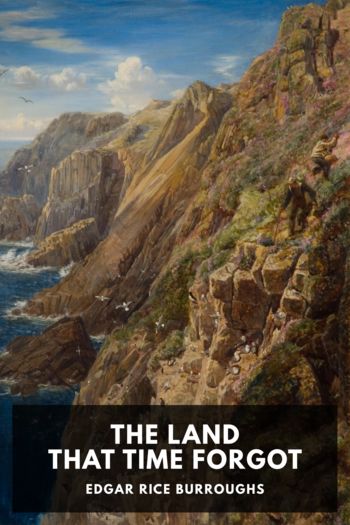South!, Ernest Shackleton [good books to read in english TXT] 📗

- Author: Ernest Shackleton
Book online «South!, Ernest Shackleton [good books to read in english TXT] 📗». Author Ernest Shackleton
The tale of the next sixteen days is one of supreme strife amid heaving waters. The sub-Antarctic Ocean lived up to its evil winter reputation. I decided to run north for at least two days while the wind held and so get into warmer weather before turning to the east and laying a course for South Georgia. We took two-hourly spells at the tiller. The men who were not on watch crawled into the sodden sleeping-bags and tried to forget their troubles for a period; but there was no comfort in the boat. The bags and cases seemed to be alive in the unfailing knack of presenting their most uncomfortable angles to our rest-seeking bodies. A man might imagine for a moment that he had found a position of ease, but always discovered quickly that some unyielding point was impinging on muscle or bone. The first night aboard the boat was one of acute discomfort for us all, and we were heartily glad when the dawn came and we could set about the preparation of a hot breakfast.
This record of the voyage to South Georgia is based upon scanty notes made day by day. The notes dealt usually with the bare facts of distances, positions, and weather, but our memories retained the incidents of the passing days in a period never to be forgotten. By running north for the first two days I hoped to get warmer weather and also to avoid lines of pack that might be extending beyond the main body. We needed all the advantage that we could obtain from the higher latitude for sailing on the great circle, but we had to be cautious regarding possible ice-streams. Cramped in our narrow quarters and continually wet by the spray, we suffered severely from cold throughout the journey. We fought the seas and the winds and at the same time had a daily struggle to keep ourselves alive. At times we were in dire peril. Generally we were upheld by the knowledge that we were making progress towards the land where we would be, but there were days and nights when we lay hove to, drifting across the storm-whitened seas and watching with eyes interested rather than apprehensive the uprearing masses of water, flung to and fro by Nature in the pride of her strength. Deep seemed the valleys when we lay between the reeling seas. High were the hills when we perched momentarily on the tops of giant combers. Nearly always there were gales. So small was our boat and so great were the seas that often our sail flapped idly in the calm between the crests of two waves. Then we would climb the next slope and catch the full fury of the gale where the wool-like whiteness of the breaking water surged around us. We had our moments of laughter—rare, it is true, but hearty enough. Even when cracked lips and swollen mouths checked the outward and visible signs of amusement we could see a joke of the primitive kind. Man’s sense of humour is always most easily stirred by the petty misfortunes of his neighbours, and I shall never forget Worsley’s efforts on one occasion to place the hot aluminium stand on top of the Primus stove after it had fallen off in an extra heavy roll. With his frostbitten fingers he picked it up, dropped it, picked it up again, and toyed with it gingerly as though it were some fragile article of lady’s wear. We laughed, or rather gurgled with laughter.
The wind came up strong and worked into a gale from the northwest on the third day out. We stood away to the east. The increasing seas discovered the weaknesses of our decking. The continuous blows shifted the box-lids and sledge-runners so that the canvas sagged down and accumulated water. Then icy trickles, distinct from the driving sprays, poured fore and aft into the boat. The nails that the carpenter had extracted from cases at Elephant Island and used to fasten down the battens were too short to make firm the decking. We did what we could to secure it, but our means were very limited, and the water continued to enter the boat at a dozen points. Much baling was necessary, and nothing that we could do prevented our gear from becoming sodden. The searching runnels from the canvas were really more unpleasant than the sudden definite douches of the sprays. Lying under the thwarts during watches below, we tried vainly to avoid them. There were no dry places in the boat, and at last we simply covered our heads with our Burberrys and endured the all-pervading water. The baling was work for the watch. Real rest we had none. The perpetual motion of the boat made repose impossible; we were cold, sore, and anxious. We moved on hands and knees





Comments (0)